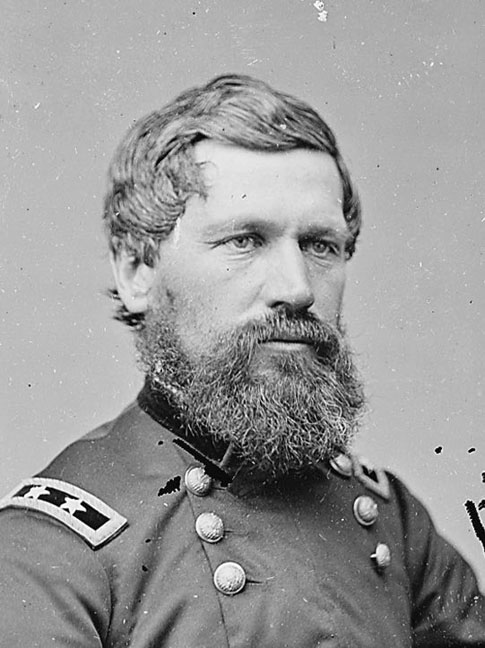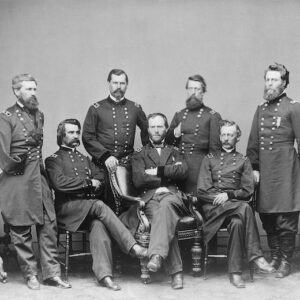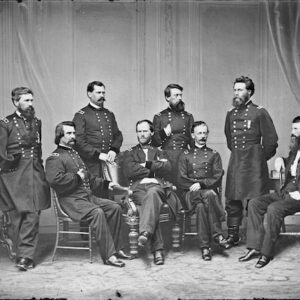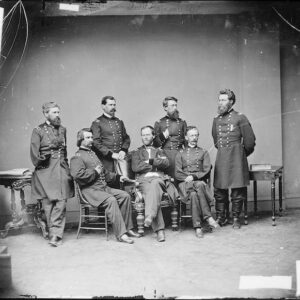Tag: Howard (Oliver O.)
 Wikipedia says: Oliver Otis Howard (November 8, 1830 – October 26, 1909) was a career United States Army officer and a Union general in the American Civil War. As a brigade commander in the Army of the Potomac, Howard lost his right arm while leading his men against Confederate forces at the Battle of Fair Oaks/Seven Pines in June 1862, an action which later earned him the Medal of Honor. As a corps commander, he suffered two major defeats at Chancellorsville and Gettysburg in May and July 1863, but recovered from the setbacks as a successful corps and later army commander in the Western Theater.
Wikipedia says: Oliver Otis Howard (November 8, 1830 – October 26, 1909) was a career United States Army officer and a Union general in the American Civil War. As a brigade commander in the Army of the Potomac, Howard lost his right arm while leading his men against Confederate forces at the Battle of Fair Oaks/Seven Pines in June 1862, an action which later earned him the Medal of Honor. As a corps commander, he suffered two major defeats at Chancellorsville and Gettysburg in May and July 1863, but recovered from the setbacks as a successful corps and later army commander in the Western Theater.
Known as the “Christian general” because he tried to base his policy decisions on his deep, evangelical piety, he was given charge of the Freedmen’s Bureau in mid-1865, with the mission of integrating the former slaves into Southern society and politics during the second phase of the Reconstruction Era. Howard took charge of labor policy, setting up a system that required freed people to work on former plantation land under pay scales fixed by the Bureau, on terms negotiated by the Bureau with white land owners. Howard’s Bureau was primarily responsible for the legal affairs of the freedmen. He attempted to protect freed blacks from hostile conditions, but lacked adequate power, and was repeatedly frustrated by President Andrew Johnson.
Howard’s allies, the Radical Republicans, won control of Congress in the 1866 elections and imposed Radical Reconstruction, with the result that freedmen were given the vote. With the help and advice of the Bureau, freedmen joined Republican coalitions and won at the ballot boxes of most of the southern states. Howard was also a leader in promoting higher education for freedmen, most notably in founding Howard University in Washington and serving as its president 1867–73; and aided in the charter of Howard University and Atlanta University, now Clark Atlanta University, in 1867.
After 1874, Howard commanded troops in the West, conducting a famous campaign against the Nez Perce tribe. Utley (1987) concludes that his leadership against the Apaches in 1872, against the Nez Perce in 1877, the Bannocks and Paiutes in 1878, and against the Sheepeaters in 1879 all add up to a lengthy record, although he did not fight as much as George Custer and Nelson Miles.
…Howard was appointed colonel of the 3rd Maine Infantry regiment and temporarily commanded a brigade at the First Battle of Bull Run. He was promoted to brigadier general effective September 3, 1861, and given permanent command of his brigade. He then joined Maj. Gen. George B. McClellan’s Army of the Potomac for the Peninsula Campaign.
On June 1, 1862, while commanding a Union brigade in the Fair Oaks, Howard was wounded twice in his right arm, which was subsequently amputated. (He received the Medal of Honor in 1893 for his heroism at Fair Oaks.) Brig. Gen. Philip Kearny, who had lost his left arm, visited Howard and joked that they would be able to shop for gloves together. Howard recovered quickly enough to rejoin the army for the Battle of Antietam, in which he rose to division command in the II Corps. He was promoted to major general in November 1862 and assumed command of the XI Corps the following April, replacing Maj. Gen. Franz Sigel. Since the corps was composed largely of German immigrants, many of whom spoke no English, the soldiers were resentful of their new leader and openly called for Sigel’s reinstatement.
At the Battle of Chancellorsville, Howard suffered the first of two significant military setbacks. On May 2, 1863, his corps was on the right flank of the Union line, northwest of the crossroads of Chancellorsville. Robert E. Lee and Lt. Gen. Thomas J. “Stonewall” Jackson devised an audacious plan in which Jackson’s entire corps would march secretly around the Union flank and attack it. Howard was warned by Maj. Gen. Joseph Hooker, now commanding the Army of the Potomac, that his flank was “in the air”, not anchored by a natural obstacle, such as a river, and that Confederate forces might be on the move in his direction. Howard failed to heed the warning and Jackson struck before dark, routing the XI Corps and causing a serious disruption to the Union plans.
At the Battle of Gettysburg, the XI Corps, still chastened by its humiliation in May, arrived on the field in the afternoon of July 1, 1863. Poor positioning of the defensive line by one of Howard’s subordinate division commanders, Brig. Gen. Francis C. Barlow, was exploited by the Confederate corps of Lt. Gen. Richard S. Ewell and once again the XI Corps collapsed, forcing it to retreat through the streets of Gettysburg, leaving many men behind to be taken prisoner. On Cemetery Hill, south of town, Howard quarreled with Maj. Gen. Winfield S. Hancock about who was in command of the defense. Hancock had been sent by Maj. Gen. George G. Meade with written orders to take command, but Howard insisted that he was the ranking general present. Eventually he relented. Controversy centers on three points: 1) Howard’s choice of Cemetery Hill as the key to defense; 2) the timing of Howard’s mid-afternoon order to abandon positions north and west of town; and 3) Howard’s reluctance to recognize that Hancock, his junior, had superseded him. Historian John A. Carpenter holds that Howard alone had wisely selected Cemetery Hill, that the order to withdraw was probably a sound one, and that the conflict between Howard and Hancock might have been avoided had Meade himself gotten onto the field.
Howard started circulating the story that his corps’ failure had actually been triggered by the collapse of Maj. Gen. Abner Doubleday’s I Corps to the west, and this was a partial reason for Doubleday’s removal from command of the corps. However, this excuse was not accepted by history—the reverse was actually true—and the reputation of the XI Corps was ruined. Some argue that Howard should get some credit for the eventual success at Gettysburg because he wisely stationed one of his divisions (Maj. Gen. Adolph von Steinwehr’s) on Cemetery Hill as a reserve and critical subsequent defensive line. For the remainder of the three-day battle, the corps remained on the defensive around Cemetery Hill, withstanding assaults by Maj. Gen. Jubal Early on July 2 and participating at the margin of the defense against Pickett’s Charge on July 3. Also at Gettysburg, Howard’s younger brother, Major Charles Henry Howard, served as his aide-de-camp.
Howard and XI Corps were transferred to the Western Theater with fellow general Henry Slocum’s XII Corps to become part of the Army of the Cumberland in Tennessee; they were commanded once again by “Fighting Joe” Hooker. In the Battles for Chattanooga, the corps joined the impulsive assault that captured Missionary Ridge and forced the retreat of Gen. Braxton Bragg. In July 1864, following the death of Maj. Gen. James B. McPherson, temporary command of the Army of the Tennessee was given by order of William Tecumseh Sherman to the ranking officer on the field that day, Major General John A. Logan. Shortly after the success at the Battle of Atlanta, Sherman (who favored granting command to a West Point graduate) appointed Howard to permanent command of the Army of the Tennessee. At the closing of his “After Action Report” filed by Major General John A. Logan on September 10, 1864, Logan referred to his having served as Commander of the Army of the Tennessee for a scant four days. Logan’s detailed report ended with: “I withdrew the Army of the Tennessee the night of the 26th, and moved it along the rear of the center and right of the army to a position across Proctor’s Creek. After putting the army in position that night I was relieved by Maj. Gen. Howard.” Howard subsequently led the right wing of Maj. Gen. William Tecumseh Sherman’s famous March to the Sea, through Georgia and then the Carolinas. Sherman, having favored Howard over Logan for permanent command of the Army of the Tennessee, recognized Logan’s success at Atlanta. In recognition of the outstanding leadership Logan displayed at Atlanta, Sherman asked Howard to allow Logan to ceremonially lead the Army in the May 1865 Grand Review in Washington. Howard agreed when Sherman appealed to him as a Christian gentleman. Ultimately, by the war’s end, Gen. Sherman would commend Howard as a corps commander of “the utmost skill, nicety and precision”.


